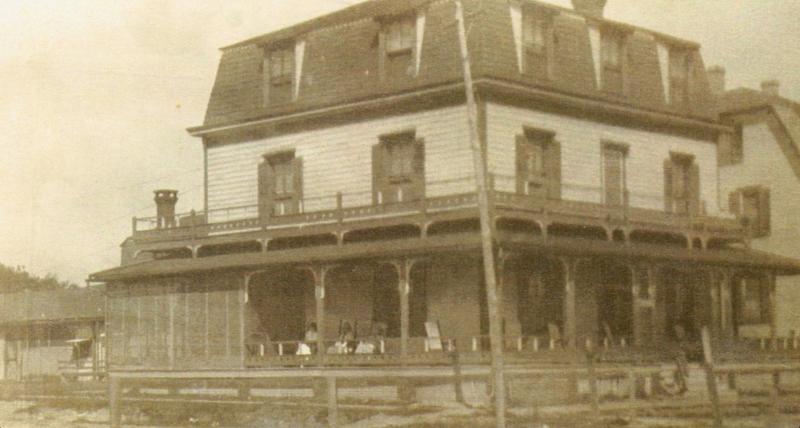Commodore Shock was one of Rehoboth’s founding fathers
Addressing a few dozen folks at the Boardwalk Plaza Hotel, Rehoboth Beach historian Paul Lovett said he hadn’t planned on doing a deep dive into the life of Commodore William H. Shock, but that changed when he came across an old photo from 1905 of Shock’s cottage on the Boardwalk.
Lovett said the only thing he knew about Shock was that he had attained the rank of commodore in the U.S. Navy. A short time later, he said, he was talking about this unknown Commodore Shock with his son-in-law, a retired Navy master chief.
A short time later, his son-in-law pulled up a page on the internet and showed Lovett a picture of Shock. From there, said Lovett, he began to research the story behind one of Rehoboth Beach’s original fathers.
Lovett said Shock’s name is all over the handwritten minutes from town meetings in the 1890s.
Lovett read a tribute to the commodore published July 20, 1901, in the Rehoboth Beacon. Shock was born June 15, 1821, in Baltimore. He was appointed an officer in the U.S. Navy in January 1845 and saw active service in the Mexican War.
According to the tribute, Shock “fought with credit and distinction,” and was later appointed engineer in chief of the U.S. Navy and visited nearly every foreign station. He was one of the first Americans to land on Chinese soil, says the Beacon article.
The Beacon tribute describes Shock as one of the earliest residents of Rehoboth, “appreciating at once its natural advantages and its excellent location. He has been most public spirited and ready to help every good work.”
Lovett noted that Shock tribute was between an, “Ode to the moon,” and a story about some kids getting a sunburn on a walk south to what is now the Indian River Inlet.
Lovett speculated that Shock might have first come across Rehoboth in the mid-1800s while on board a survey steamer from Philadelphia making its way along the Delaware coastline after coming out of the Delaware River. If he had done that, said Lovett, there would have been two blooms of smoke coming from the Rehoboth area – one from the Lorenzo Dow Martin House and one from the Peter Marsh Homestead, which is part of the Rehoboth Art League in Henlopen Acres.
According to service records found by Lovett, Shock oversaw the fleet of steamers used by the U.S. Mail, helped install the steam boilers at West Point and wrote a textbook that was used at the Naval Academy for decades.
Lovett said he went to the Naval Academy, and while he doesn’t remember it, he’s sure he would have read Shock’s book.
Lovett said by the time Shock arrived in Rehoboth, around 1880, there would have been four permanent residents, but 36 summer residences.
After taking a boat across the Chesapeake Bay, Shock would have traveled by train to Rehoboth. The Lewes-Rehoboth Canal would not have been here while he was alive, said Lovett.
A deeply religious man, Shock was also a major contributor to the founding of Epworth Church, said Lovett. The church's original location is where the Cultured Pearl is today, he said.
For more information on Shock’s importance to the early development of Rehoboth Beach, go to Lovett’s website on the Golden Age of Rehoboth.
Final of four lectures June 9
Lovett has already held three lectures – one on Lorenzo Dow Martin and a video interview with Kitty Cole that featured imagery of her life in Rehoboth more than 50 years ago. The Shock lecture was the third. Lovett’s final lecture is scheduled for Thursday, June 9, and will be about the wealthy barons of industry who built cottages on the Boardwalk in the 1880s.
Lectures begin at 7:15 p.m. and take place in the Kent/Sussex Room of Boardwalk Plaza Hotel, 2 Olive Ave. The cost of each lecture is $25, with money going toward the continued building of Lovett’s diorama of Rehoboth Beach in the early 1920s. The diorama of the railroad era of Rehoboth comprises 70 buildings over five tables. To reserve a seat at one of the lectures, call 302-521-4190.
Chris Flood has been working for the Cape Gazette since early 2014. He currently covers Rehoboth Beach and Henlopen Acres, but has also covered Dewey Beach and the state government. He covers environmental stories, business stories and random stories on subjects he finds interesting, and he also writes a column called Choppin’ Wood that runs every other week. He’s a graduate of the University of Maine and the Landing School of Boat Building & Design.























































